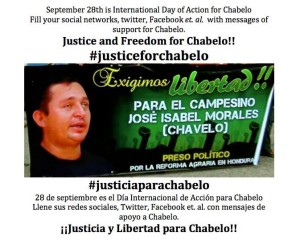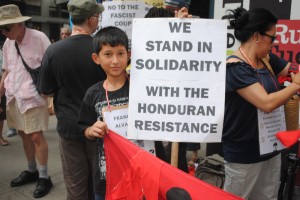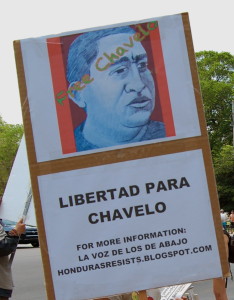|
Honduras
Solidarity
Network USA-Canada
http://www.hondurassolidarity.org/
.
.
|
Category Archives: Press Release
On the Assassination of Berta Cáceres
El español sigue el ingles
The Honduras Solidarity Network of North America
On the Assassination of Berta Cáceres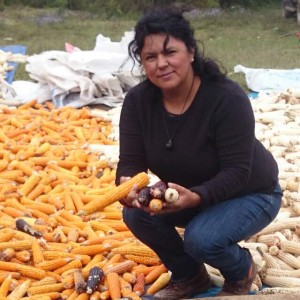
With indignation and sadness, the organizations that form the Honduras Solidarity Network of North America denounce the assassination of Berta Caceres, leader of the indigenous Lenca organization COPINH and a tireless fighter for social justice and for the defense of the environment and indigenous territories. Recognized around the globe for her leadership and spirit in 2015 she received the world’s leading environmental award the Goldman Environmental Prize. Many of our members knew Berta and have witnessed first hand her courage and integrity. We join the multitude of voices in Honduras and the world raised against this outrage
Berta became an activist when she was still a teenager and continued even in the face of violence from the government and oligarchy, arrests and threats. After the 2009 coup, Berta and COPINH took up an important role in the resistance movement despite the unleashing of a ferocious repression against that resistance and the peoples’ movement in Honduras and against leaders like Berta.
After the coup, attacks on the indigenous and campesino communities in Honduras escalated as land grabbing by the government, the oligarchy and international mining and hydroelectric companies increased. Berta and COPINH are in the forefront of the struggle of the indigenous people for their land and a number of COPINH members have been assassinated and others arrested and threatened during this struggle.
Over the past few weeks, repression and threats escalated. On February 20th, Berta and other members of COPINH and the community of Rio Blanco were physically threatened by police and military trying to stop a peaceful activity in defense of the Gualcarque River which is threatened by a hydroelectric project of the Honduran company DESA with international financing. On February 25th another Lenca community supported by COPINH was violently evicted from their land.
We strongly support human rights defenders in Honduras and internationally in demanding that there be a serious and complete, independent international investigation of Berta’s murder so that all those involved are identified and brought to justice rapidly. We reject any attempt to criminalize the leaders and members of COPINH. Berta was a recipient of an order for protective measures by the Inter-American Human Rights Court due to the constant threats and harassment against her and we are concerned and angered to hear pronouncements by Julian Pacheco, Minister of Security at a press conference this morning that can only be seen as an attempt to sidestep responsibility for her security and to blame the victim of this political crime.
We have read the communique of condolences issued by the US Embassy in Honduras earlier today and can only say that, “actions speak louder than words”. The US government has been and is the main economic and political support for the governments in power since the 2009 coup, including the current government of Juan Orlando Hernandez. The US government bears its own responsibility for the militarization and downward spiral in all spheres of life in Honduras, and for the grave human rights situation. We reiterate the demand that US aid and training to the Honduran security and military apparatus be stopped immediately because it, in action, supports human rights violations such as the murder of Berta Caceres.
We express our most profound condolences to Berta Caceres’ family, her organization, her community, and the Honduran people and their organizations in struggle as well as our own determination to redouble our solidarity.
March 3, 2016
The Honduras Solidarity Network of North AmericaThe HSN is made up of more than 30 organizations in Canada and the United States.
*******************************************************
Comunicado sobre el asesinato de Berta Caceres
Con indignación y tristeza, las organizaciones que integramos la Red de Solidaridad con Honduras de América del Norte, denunciamos el asesinato de Berta Cáceres, la dirigente de la organización indígena lenca COPINH y una luchadora incansable por la justicia social y por la defensa del medio ambiente y los territorios indígenas. Ella es reconocida en todo el mundo por su liderazgo y su espíritu. En el 2015 ella recibió el premio ambiental más importante del mundo, el Premio Ambiental Goldman. Muchos de nuestros miembros conocían a Berta y han sido testigos de primera mano de su valor e integridad. Nos sumamos a la multitud de voces en Honduras y en el mundo que están alzadas en contra de este acto ultrajante.
Berta se convirtió en una activista cuando todavía era un adolescente y continuó, incluso en la cara de la violencia por parte del gobierno y la oligarquía, y las detenciones y amenazas. Después del golpe de estado del 2009, Berta y el COPINH jugaron un papel importante en el movimiento de resistencia a pesar del desencadenamiento de una represión feroz contra esa resistencia y el movimiento popular en Honduras y en contra de líderes como Berta.
Después del golpe, los ataques a las comunidades indígenas y campesinas de Honduras se intensificaron con cada vez más acaparamiento de tierras por parte del gobierno, la oligarquía y las compañías mineras e hidroeléctricas internacionales. Berta y el COPINH han estado en la vanguardia de la lucha de los pueblos indígenas por sus territorios y varios miembros del COPINH han sido asesinados, detenidos y amenazados durante esta lucha.
Durante las últimas semanas, la represión y las amenazas se intensificaron. El 20 de febrero, Berta y otr@s miembros y miembras del COPINH y de la comunidad de Río Blanco fueron amenazad@s físicamente por la policía y por los militares quienes pretendían detener una actividad pacífica en defensa del Río Gualcarque, lo cual se ve amenazado por un proyecto hidroeléctrico de la empresa Hondureña DESA con financiamiento internacional. El 25 de febrero otra comunidad lenca apoyado por el COPINH fue desalojada violentamente de sus tierras.
Apoyamos firmemente a las defensoras y los defensores de derechos humanos en Honduras e internacionalmente en la exigencia de que el asesinato de Berta sea seriamente, completamente, independientemente e internacionalmente investigado de manera que todos los participantes sean identificados y llevados ante la justicia rápidamente. Rechazamos contundentemente cualquier intento de criminalizar a los y las líderes y miembr@s del COPINH. Berta había recibido medidas cautelares por parte de la Corte Interamericana de Derechos Humanos debido a las constantes amenazas y hostigamiento en contra de ella. Estamos sumamente preocupados y enfurecidos al escuchar las declaraciones de Julián Pacheco, Ministro de Seguridad, en una conferencia de prensa esta mañana que sólo puede ser visto como un intento de eludir la responsabilidad del estado por la seguridad de Berta y de culpar a la víctima misma de este crimen político.
Hemos leído el comunicado de pésame emitido por la Embajada de los Estados Unidos en Honduras el día de hoy y sólo podemos decir que, “las acciones hablan más que las palabras.” El gobierno de Estados Unidos ha sido y sigue siendo la fuente principal de apoyo económico y político al gobierno hondureño desde el golpe de estado del 2009, incluyendo al gobierno actual de Juan Orlando Hernández. El gobierno de Estados Unidos tiene su propia responsabilidad por la militarización y el deterioro en todos los ámbitos de la vida en Honduras, y por la grave situación de los derechos humanos. Reiteramos la exigencia de que se detenga de inmediato toda la ayuda de los Estados Unidos al aparato de seguridad y militar y el entrenamiento a los mismos en Honduras, ya que representa apoyo directo a las violaciones de los derechos humanos, tales como el asesinato de Berta Cáceres.
Expresamos nuestras más profundas condolencias a la familia de Berta Cáceres, a su organización, a su comunidad y al pueblo hondureño y sus organizaciones en lucha, así también expresamos nuestra propia determinación de redoblar nuestra solidaridad.
El día 3 de Marzo 2016
La Red de Solidaridad con Honduras – Honduras Solidarity Network
en Norteamérica
La HSN esta compuesta de más de 30 organizaciones en Canada y EEUU
Webinar on Honduras and Solidarity: Sign up now!
Webinar: Honduras, What is the story?
There is still time to register for the Honduras Solidarity Network’s educational webinar and conversation on Sunday, January 17, 2016.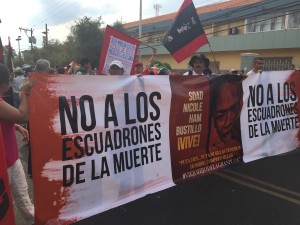
We will hear from presenters with unique expertise in Honduras. They will share their perspective on its history and current political-economic situation, the resistance and social justice movements, and the role of the United States government in the region. Register Here Now
Professor Rodolfo Pastor Fasquelle: Professor Pastor has a Doctorate in History and is an expert on Latin American history, politics and colonialism. He was Minister of Culture in President Manual Zelaya’s government and had to flee the country as a political refugee right after the June 28, 2009 coup. He later returned to Honduras and now lives in San Pedro Sula.
Gerardo Torres Zelaya: Gerardo became a political activist as a student and was a member of the organization Los Necios at the time of the coup in 2009. Since the coup he has been an active member of the National Front for Popular Resistance (FNRP) and the opposition political party LIBRE. He is a journalist and analyst and currently is the Central American correspondent for TeleSUR English.
Annie Bird: Annie has worked in Guatemala and Honduras investigating and documenting human rights violations and conditions in indigenous and small farming communities. From 1997-2014 she was Co-Director for the organization Rights Action and now is the director of the Rights and Ecology program of the Center for Political Economy. Over the last several years she has published numerous reports on US policy, militarization and human rights in Honduras.
Join us: Sunday, January 17, 2016 at 1pm – 3pm Pacific Time; 2pm – 4pm Mountain; 3pm – 5pm Central; 4pm – 6pm Eastern
The webinar is free of charge but you must register to participate: Register Here Now
For more information contact: honsolnetwork@gmail.com
Help Save Lives – Human rights accompaniment in Honduras
New Opportunities to Visit Honduras and Walk with the People! See our upcoming delegations here.
Help Save Lives – Support Human rights accompaniment in Honduras :
Click here to make a tax-deductible donation by credit card online, or send a check with “accompaniment” in the memo line to:Honduras Solidarity Network c/o Alliance for Global Justice, 225 E 26th St., Ste. 1, Tucson, AZ 85713

A Honduras cooperative leader is picked up by police in the Aguan Valley. Demonstrating students at the Autonomous University in Tegucigalpa are surrounded by police. An army unit sets up camp in the middle of a farming cooperative. A political prisoner is transported to court amid death threats.
 International accompaniers save lives and liberty in Honduras. Just this month “Chabelo,” a campesino farmer was found innocent after spending eight years in prison for a crime he did not commit. For the past three years Greg McCain and the Honduras Solidarity Network accompanied Chabelo and his family through repeated court hearings amid increasingly serious death threats to his final exoneration. There is no such thing as justice for campesinos in Honduras. Only because of international mobilizations and accompaniment was he finally set free. You can help free future Chabelos or stop their murders by supporting HSN’s human rights accompaniment by donating now.
International accompaniers save lives and liberty in Honduras. Just this month “Chabelo,” a campesino farmer was found innocent after spending eight years in prison for a crime he did not commit. For the past three years Greg McCain and the Honduras Solidarity Network accompanied Chabelo and his family through repeated court hearings amid increasingly serious death threats to his final exoneration. There is no such thing as justice for campesinos in Honduras. Only because of international mobilizations and accompaniment was he finally set free. You can help free future Chabelos or stop their murders by supporting HSN’s human rights accompaniment by donating now.Long-term and short-term human rights accompaniment is among the most important solidarity that we can provide to the brave people of Honduras who struggle for justice and democracy. Short-term accompaniment delegations, organized by many of the 30 groups in the Honduras Solidarity Network, are important, indeed vital. But there are many times when there is no delegation in the country. At those times Greg McCain and Karen Spring put their own safety on the line to expose human rights violations and to mobilize international solidarity. They are a physical presence and they assist with on-going human rights cases and investigations, community projects, informing international press, and sending out articles and opinion pieces to frame the debate about the US and Canadian role in Honduras.
 d transport long-term accompaniers so they can do this important work. Greg raises his own costs. Karen, who is also the in-country coordinator of the HSN, is supported by the Network.
d transport long-term accompaniers so they can do this important work. Greg raises his own costs. Karen, who is also the in-country coordinator of the HSN, is supported by the Network.Please support the work of the Honduras Solidarity Network by donating now!
Letter in Support of Chabelo Morales
HSN member organizations and others (32 total) joined in a letter in support of Chabelo Morales (English letter below) as he goes to his third trial for the same charges. 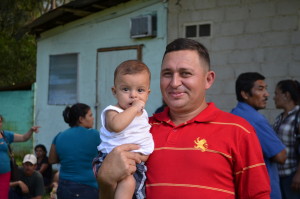
September 2015
As representatives from the international human rights and solidarity community, we come together to demand justice for José Isabel “Chabelo” Morales during his retrial. In that there are currently over 5000 campesinos with judicial proceedings against them, Chabelo’s case is emblematic of the criminalization of peasant farmers (campesinos) who struggle for access to land.
In light of the persistent violations to human rights in Honduras, we demand:
⦁ That Chabelo’s retrial scheduled for September 28th – October 9th, 2015 be fair and impartial. Further, we demand unconditional freedom for Chabelo.
⦁ A full investigation into human rights violations and judicial irregularities surrounding all of Chabelo’s judicial hearings.
⦁ A full investigation into the ongoing threats and intimidation against the Morales family and community of Guadalupe Carney.
⦁ A full investigation into the abuse of authority of Colonel Henry Osorto Canales who was recently nominated for advancement from Sub-Commissioner of the National Police to the position of Commissioner.
⦁ A suspension of aid to Honduran police, military and security until the human rights violations perpetrated by these forces ceases; specifically, the continued aid by the United States to the National Police and funding to the Public Prosecutors office (Ministerio Publico) given the ongoing abuses.
José Isabel “Chabelo” Morales López, 39, was in prison for 6 years, 9 months, and 7 days for a crime that he did not commit. He and his family are campesinos in the Aguán Valley in the heart of the African palm-producing region of the northern coast of Honduras. His arrest and imprisonment were aimed at punishing and criminalizing the campesino movement in Honduras as well as being products of the well-documented corruption and impunity that has this country in its grip. Chabelo is recognized as being unjustly imprisoned by numerous human rights and rural advocacy groups including Via Campesina, SOAW, FIAN International, COFADEH and ERIC-SJ.
Chabelo was arrested in October 2008 after heavily armed members of Henry Osorto’s family and private security attacked the campesinos in an attempt to illegally take land that had been legally granted to the campesinos. One campesino was killed by shots from the Osorto house and 11 members of the Osorto group were left dead. In a clear conflict of interest and abuse of authority, Henry Osorto led the investigation which was incomplete, inconsistent, and forensically questionable.
Arrest warrants for 36 residents of Chabelo’s community were issued without evidence that theindividuals were involved. Chabelo was one of them, he and one other person were the only ones arrested and charged with 11 counts of murder, arson, and robbery despite there being no concrete evidence of their involvement. At his trial over two years after his detention (a clear violation of the Honduran Penal Code, and notably after the military coup in June 2009) the charges were reduced to one count of homicide. The other person was found not guilty due to contradictions in the testimony of the prosecution witnesses and yet they let these same contradictions stand in the conviction of Chabelo.
The panel of judges found Chabelo guilty despite a lack of evidence and the contradictory stories, but sentencing was delayed for over 2 years. Because of that and many other irregularities, the Honduran Supreme Court annulled his conviction and ordered a new trial which took place in January 2014. The new trial was moved to another department, but was assigned judges from the Aguán, including two who had refused to release Chabelo from prison pending the new trial, a clear violation of the Supreme Court order. The defense asked for the two judges to recuse themselves but lost the decision.
Prosecution witnesses including Henry Osorto perjured themselves once again, radically changing their testimony and contradicting their sworn statements in an attempt to incriminate Chabelo. The judges refused to allow the defense to place those contradictions into the record. The prosecution echoed statements made by Osorto about the small farmers in general being violent terrorists rather than giving evidence as to Chabelo’s involvement. Defense witnesses presented the same testimony as previously, noting that Chabelo was not present at the scene when the confrontation and deaths occurred. The judges found Chabelo guilty and he was sentenced to 17.5 years. Chabelo’s defense lawyers filed an appeal, which was finally reviewed by the Supreme Court.
The court once again annulled the conviction and sentencing based on procedural inconsistencies on the part of the prosecutor and judges, but once again ordered a retrial. The Defense also solicited the court to free Chabelo pending the retrial based on numerous violations to the penal code. This was the seventh solicitation in five years based on these violations.
The initial hearing of the retrial was held on July 24th, 2015 in La Ceiba. The magistrates quickly ruled in favor of Chabelo’s release based on the violations and scheduled the retrial to be held between September 28th and October 9th in Trujillo.
Based on the clear violations to the human rights of Chabelo Morales, we demand his unconditional freedom. In addition to the demands stated above we further demand protection from retaliation on the part of Colonel Henry Osorto Canales against Chabelo Morales and his family.
Signed,
1) La Voz de los de Abajo, Chicago
2) Alliance for Global Justice
3) Nicaragua Center for Community Action (NICCA), Berkeley, CA
4) International Action Center
5) Michigan Emergency Coalition Against War and Injustice
6) Colectivo Honduras USA Resistencia=libre (D19/New York)
7) Task Force On the Americas
8) San Francisco School of the Americas Watch (SOAWSF)
9) Latin America Solidarity Committee, Milwaukee
10) Bay Area Latin American Solidarity Committee (BALASC)
11) The Cross Border Network, Kansas City, MO
12) Portland Central America Solidarity Committee
13) Hondureños Por La Pachamama
14) Oakland – School of the Americas Watch, USA
15) Hondureños D19 Northern California
16) Radios Populares, Chicago
17) Witness for Peace Southwest
18) Gay Liberation Network, Chicago
19) US El Salvador Sister Cities
20) Inter-Faith Committee on Latin America, St. Louis
21) School of the Americas Watch (SOAW)
22) Chicago Religious Leadership Network on Latin America (CRLN)
23) FIAN Internacional – Sección Honduras
24) Movimiento Ambientalista Santabarbarense (MAS)
25) Foro de Mujeres por la Vida
26) COLLETTIVO ITALIA CENTRO AMERICA, CICA
27) Grassroots International
28) Observatorio Permanente de Derechos Humanos del Aguán
29) Voices for Creative Nonviolence
30) Workers World Party
31) Loretto – Kansas City
32) 8th Day Center for Justice, Chicago
September 28 – Action for Chabelo
U.S. Congressional Letter to Secretary of State Again Expresses Opposition
Below is an article from CEPR analyzing the most recent (August 19, 2015) Congressional letter to the U.S. Secretary of State calling for an end to US Security Assistance to Honduras due to the ongoing human rights crisis. The letter itself can be read here in English or Spanish.
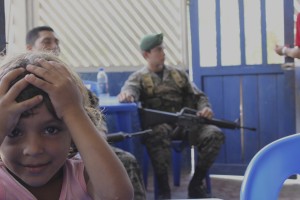
Photo : Toussaint Losier published in Honduras Resists
Congressional Democrats Voice Renewed Opposition to U.S. Security Assistance to Honduras – Will Kerry Finally Listen?
- Written by Alexander Main
Over the last few months, military police agents have reportedly threatened and harassed journalists, community leaders, and members of the indigenous organization COPINH; forcibly evicted small farmers without a warrant; raided the home of a student leader involved in recent protests; and shot and killed an unarmed woman selling mangos, among other alleged crimes. As reported by Al-Jazeera, Defensores en Linea and Today Media Network, these forces have also allegedly conducted raids against the homes of opposition activists, and participated in the killing of land-rights activists and peaceful demonstrators.
The U.S. government’s response to these alarming developments has been to request more security assistance for Honduras, in particular through an increase in funding for the opaque Central American Regional Security Initiative (CARSI). There’s no indication that the administration is concerned about Honduras’ militarization or that it is seeking to leverage U.S. security assistance to try to reverse the trend. On the contrary, it has been providing direct support to militarization efforts, as the Johnson/Schakowsky letter notes:
We are concerned about Honduran media reports that in mid-May of this year, a team of 300 U.S. military and civilian personnel, including Marines and the FBI, conducted “rapid response” training with 500 [agents from] FUSINA [a militarized security task force combining personnel from police, military, intelligence and judicial agencies], using U.S. helicopters and planes, despite allegations regarding the agency’s repeated involvement in human-rights violations.
Similarly, U.S. green beret special forces have been training a militarized Honduran police unit called the TIGRES [which stands for Intelligence Troop and Special Security Response Groups], “instilling fundamental principles of close quarters battle and knowing how to execute them amidst the chaos that is combat”, according to a U.S. Army article published in March. Though touted as an exemplary, elite force, nearly two dozen TIGRES agents, trained and vetted by the U.S. government, were caught stealing over $1.3 million in drug money following a counter-narcotics operation late last year.
In addition to asking for security assistance to Honduras to be put on hold, the Johnson/Schakowsky letter makes a series of detailed requests which focus on getting the State Department to genuinely implement human rights safeguards required by law and to increase transparency around security aid programs in Honduras.
The letter asks for:
– “The State Department’s strict evaluation of U.S. support and training for the Honduran police and military in accordance with human rights conditions placed in the FY2015 State and Foreign Operations Appropriations Act.” [A Senate Appropriations Committee report that accompanies the FY2015 SFOPS Act specifies that 50% of security assistance allocated to Honduras under International Narcotic Control and Law Enforcement and Foreign Military Funding headings be withheld pending State Department certification of Honduran government compliance with six human rights and rule of law conditions that include the investigation and prosecution of “army and police personnel who are credibly alleged to have violated human rights.” In the past, the State Department has generally certified the Honduran government as compliant with conditions set by the Committee, despite the strong misgivings expressed by 21 U.S. senators (i.e., 1/5th of the Senate). It’s worth noting that the Committee report attached to pending FY2016 appropriations legislation has conditioned 75% of all assistance under State and Foreign Operations appropriations to Honduras, Guatemala and El Salvador, and includes, among its new set of conditions, State Department certification that the governments are taking “effective steps” to “create a professional, accountable civilian police force and end the role of the military in internal policing” and to “prosecute and punish in civilian courts members of security forces who violate human rights.”]
– “Full implementation of the Leahy Law…” [which prohibits the departments of State and Defense from providing support to foreign military units that violate human rights with impunity.]
– “A detailed description of how the Department of State is currently implementing these statutes [i.e., the conditioning of security assistance under Leahy Law and existing appropriations legislation], including what metrics the Department is using to assess whether the Honduran government has adequately addressed human rights abuses.” [The State Department hasn’t revealed the methodology it employs to enforce Leahy Law provisions or SFOPS appropriations human rights conditions on aid.]
– “Urge the Honduran government to implement serious and concrete measures to address military and police abuses, and to halt the continued involvement of the military in domestic law enforcement.” [As mentioned above, these are among the aid conditionalities that the Honduran government would need to meet under the pending FY2016 appropriations legislation. There is little indication that the Honduran government is interested in implementing these measures. In early 2014, the ruling National Party eliminated a widely respected police reform commission and ignored its recommendations for cleaning up the country’s notoriously corrupt police. Under growing pressure from Congress and human rights groups, the government recently announced a series of reforms to the police – designed in tandem with U.S. advisors – that appear to amount to little more than an administrative reorganization. Given that Honduran officials still fail to acknowledge abuses by security forces, there is deep skepticism surrounding the announcement. Not to mention that there is no sign that the government is scaling back its militarization efforts].
– “Finally, we request a full itemized report on the use of funds allocated for U.S. security assistance to Honduras in the State and Foreign Operations Appropriations law for FY2015 and for upcoming FY2106 appropriations legislation.” [Effective independent scrutiny of how U.S. security assistance is used is extremely difficult given the total lack of transparency surrounding the disbursement process. Tens of millions of dollars in security assistance have been funneled to Honduras through the State Department’s notoriously opaque Central America Regional Security Initiative. As yet there is no public record of where and how the funds have been used, nor are there any clear metrics available on what sort of impact CARSI assistance has had].
Though largely ignored by the U.S. press (with the exception of one article in an inside-the-Beltway outlet and articles in the Spanish-language press), the Johnson/Schakowsky letter has received massive media attention in Honduras. The question is, will Secretary of State John Kerry pay attention to this new appeal from Congress?
HSN: Solidarity Actions
Free Political Prisoner Jose “Chabelo” Morales Lopez!
IMPORTANT UPDATE! Chabelo freed pending new trial!
On July 24, 2015 a panel of judges in court in La Ceiba, Honduras ruled in favor of a motion by the defense team for Chabelo that since his conviction was annulled he should be released from prison and allowed to defend himself in the re-trial in September as a free man. He was released to his defense lawyer and has to sign-in in person at the police headquarters weekly but for the first time in almost 7 years he is home with his family.
This victory is due to the dedicated defense team and the organized solidarity with Chabelo both inside and outside of Honduras. Now we need to step up support and win his re-trial in September. We still need signatures on the petition.
 Jose Isabel “Chabelo”Morales Lopez, 38, is a small farmer (campesino), whose family is part of Honduras’ agricultural communities in the Aguán Valley in the heart of the African palm producing region of the northern coast.
Jose Isabel “Chabelo”Morales Lopez, 38, is a small farmer (campesino), whose family is part of Honduras’ agricultural communities in the Aguán Valley in the heart of the African palm producing region of the northern coast.
He has been in prison for close to 7 years for a crime that he did not commit. His arrest and imprisonment are aimed at punishing and criminalizing the campesino movement in Honduras as well as a productof the well documented corruption and impunity that has Honduras in its grip. This has contributed to its being one of the poorest countries in the region and one of the most violent in the world. Chabelo is recognized as unjustly imprisoned by numerous human rights and rural advocacy groups such as, Via Campesina; SOAWatch; FIAN International; the Committee of the Families of the Disappeared Detainees (COFADEH); and the Jesuit institution in Honduras: ERIC‐SJ.
!No to Militarization! Sign our petition
 We, the undersigned, oppose the continued militarization by the US government of its foreign and domestic policies on behalf of the military and prison industrial complexes for the benefit of transnational corporations. June 28 marks the sixth anniversary of the US-supported military coup in Honduras, a country that exemplifies the moral bankruptcy of this policy, and serves as a warning for what is happening in our own communities. We demand:
We, the undersigned, oppose the continued militarization by the US government of its foreign and domestic policies on behalf of the military and prison industrial complexes for the benefit of transnational corporations. June 28 marks the sixth anniversary of the US-supported military coup in Honduras, a country that exemplifies the moral bankruptcy of this policy, and serves as a warning for what is happening in our own communities. We demand:
1. End military and police training and aid to Honduras, Central America, and the militarization of US local police forces.
2. Close the infamous School of the Americas (Western Hemisphere Institute for Security Cooperation).
3. Demilitarize the Drug War at home and abroad and pay reparations to the families of those murdered by a DEA operation in Ahuas, Honduras.
4. Dump the Alliance for Prosperity which will only increase militarization of Central America, and increase human rights violations and pressure on people to migrate.
For more info on US Militarization in Honduras
Honduras Solidarity Network at the US Social Forum
Join us at the San Jose and Philadelphia Social Forums June 25-June 28, 2015
Look for the HSN table at both sites, sign our petitions and participate in the HSN workshop and in workshops organized by some of our member organizations.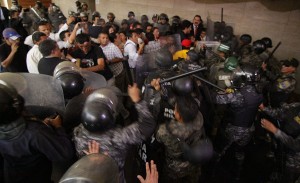
Philadelphia
Honduras: Last Gasp for Neoliberalism? Sponsored by D19 and Honduras Solidarity Network. Saturday June 27, 5pm @ Student Center 217 B
Empire of Prisons: How the United States is Spreading Mass Incarceration around the World. Sponsored by Alliance for Global Justice. Friday June 26, 10:30am @ Temple U., Mitten Hall Room 250. (1913 North Broad Street Philadelphia, PA 19122 ).
Militarization, Terror and Resistance from the US to Central America. Sponsored by La Voz de los de Abajo. Friday June 26, 8:30am @ Temple U, Student Center 217 B
Resisting the Drug War Across the Americas sponsored by School of the Americas Watch. Saturday June 27, at 9 am @ Temple U, the Student Center Cinema
San Jose
Honduras: Last Gasp for Neoliberalism? Sponsored by Honduras Solidarity Network and D19. Thursday, June 25, 1pm @East Carnegie Library, 1102 E Santa Clara St.
US Militarism in Latin America: The Need for Left Unity. Sponsored by Bay Area Latin America Solidarity Coalition (BALASC). Friday June 26, 6pm @ Unitarian Sanctuary, 160 N. 3rd St.
Cuba, Venezuela and U.S. relations. Sponsored by Task Force on the Americas. Saturday, June 27,
8:30am @ 405 S. 10th St.
For more information check out:
US Social Forum Website https://www.ussocialforum.net/
Alliance for Global Justice https://afgj.org/join-afgj-at-the-us-social-forum-this-june
SOA Watch https://soaw.org
Press Release: President of Honduras Promotes “Utopian Vision” Based on Violent Land Grabbing: San Francisco Event
El español sigue el texto en ingles
FOR IMMEDIATE RELEASE
Contacts:
Contact: Karen Spring, Honduras Solidarity Network, Tegucigalpa, Honduras
Spring.kj@gmail.com, 011-504-9507-3835
Contact: Porfirio Quintano, Honduran activist, Bay Area, California
Porfirio31@yahoo.com, 415-994-3711
Contact: Karolo Aparicio, EcoViva, Bay Area, California karolo@ecoviva.org, 510-835-1334
President of Honduras Promotes “Utopian Vision” Based on Violent Land Grabbing at San Francisco Event
Galvanize, 44 Tehama Street, San Francisco, 6 PM
OAKLAND, Calif., June 6, 2015 – Ebel Diaz, Chief of Staff of Honduran president Juan Orlando Hernandez, will appear in San Francisco on June 8, 2015. Diaz will be promoting President Hernandez’s anti – democratic vision of “Charter Cities.” These are areas within Honduran territory where Honduran law does not apply, which are instead governed by foreign governments and corporations.
Bay Area residents will turn out to protest this assault on Honduran sovereignty, and the context in which the Charter Cities are being proposed. That is government repression, violence, and impunity, backed by strong US political and financial support.
In 2011, the Honduran Congress approved legislation allowing for the creation of Charter Cities, also known as Model Cities, but two months later, four of the five Supreme Court judges found the law to be unconstitutional. Later that year, in what was termed a “technical coup,” those four judges were forced out by the Honduran Congress and replaced with judges who support the project. While an affront to the rule of law, this came as no surprise in a country still reeling from a 2009 US-supported military coup.
New legislation was passed in 2013 rebranding Charter Cities as “Zones for Employment and Economic Development” (ZEDEs). ZEDEs are investor-friendly enclaves governed by their own judiciaries, laws and security apparatus. They allow corporations to circumvent local business regulations, write their own laws, and create their own private police force. They bypass accountability to the Honduran people, grab land that sustains local people, and enforce arbitrary laws with private security.
The coastal communities whose lands are targeted for ZEDE development, some of them indigenous Garifuna, are already under siege from the repression and violence. Honduras has the highest murder rate in the world, and is one of the most dangerous countries for human rights and environmental defenders, lawyers, and journalists. In 2014, 12 environmental activists were murdered. More than 34 journalists have been killed since 2009. Since the impunity rate is over 90%, very few of these violent deaths are investigated, let alone brought to trial.
The coastal communities have also been subject to theft of their lands for tourism, resource extraction, and narcotrafficking. The corporate cities represent another threat to their territories. Yet the communities will be defenseless before the legally autonomous, unaccountable Charter Cities.
The Black Fraternal Organization of Honduras (OFRANEH), a Garifuna group which has for decades opposed land grabbing on the Northern coast, said in a May 28 declaration, “A small group of elite businessmen and politicians are trying to auction off parts of the country to foreign capital in order to create islands of affluence surrounded by a sea of poverty and violence. Honduras’ failed state is directly related to the actions of these thieves who are associated with narcotraffickers and have permitted the collapse of our legal system and corruption of our security forces.”
Charter Cities violate the Honduran constitution and Article 169 of the International Labor Organization, to which the Honduran government is a signatory, by failing to give indigenous communities the right to free, prior and informed consent before development may occur on their land. They violate democratic rights to participation, and national rights to sovereignty. Furthermore, they come into conflict with the basic concept of property – the cornerstone of both human rights and economic growth – even for the most strident free-market libertarian.
The Seasteading Institute, one of the sponsors of the June 8 event, has expressed major interest in developing a Charter City in Honduras, while ignoring the local context and the opposition from communities. OFRANEH says that the “floating city” that Seasteading hopes to construct off the coast would allow the wealthy foreign residents “to evade laws and restrictions of the nation-state, giving way to a micro -state which responds to the economic and political interests of the elite.”
# # #
PARA PUBLICACION INMEDIATA
Contactos: Contacto: Karen Spring, Red de Solidaridad con Honduras, Tegucigalpa, Honduras Spring.kj@gmail.com , 011-504-9507-3835
Contacto: Porfirio Quintano, activista de Honduras, Área de la Bahía, California Porfirio31@yahoo.com , +1 415-994-3711
Contacto: Karolo Aparicio, EcoViva, Área de la Bahía, California karolo@ecoviva.org , +1 510-835-1334
Presidente de Honduras promueve la “Visión Utópica” basada en el acaparamiento violento de tierras en un evento en San Francisco
OAKLAND, California, 07 de junio 2015 – El presidente hondureño Juan Orlando Hernández será representado por el secretario del Consejo de Ministros de Honduras, Ebal Díaz en San Francisco el 8 de junio de 2015. El secretario promoverá su visión anti-democrática de ciudades modelo. Éstas son áreas dentro del territorio hondureño, donde la ley hondureña no se aplica; y son gobernadas por gobiernos y corporaciones extranjeras.
Residentes del Área de la Bahía saldrán a protestar este asalto contra a la soberanía de Honduras, y el contexto en que se están proponiendo las Ciudades Modelo: la represión de parte del gobierno, la violencia y la impunidad, respaldado por un fuerte apoyo político y financiero de los Estados Unidos.
En el 2011, el Congreso Nacional de Honduras aprobó una ley que permitió la creación de Ciudades Modelo, pero dos meses después, cuatro de los cinco jueces de la Corte Suprema declararon la ley inconstitucional. El miso año, en lo que se denominó un “golpe técnico,” los cuatro jueces fueron destituidos por el Congreso hondureño y reemplazados por jueces que apoyaban el proyecto. Ésta afrenta al estado de derecho no fue una sorpresa considerando que el país todavía sufría los efectos de un golpe de estado apoyado por los Estados Unidos 2009.
La nueva legislación fue aprobada en el 2013 refiriendo a las ciudades modelo como como “Zonas de Empleo y Desarrollo Económico” (ZEDES). Las ZEDES son zonas favorables a los inversionistas gobernadas por sus propios tribunales, leyes y aparatos de seguridad. Permiten las empresas evitar las regulaciones locales del comercio, crear sus propias leyes, y crear su propia fuerza policial privada. Las ZEDEs evitan la responsabilidad ante el pueblo hondureño, se apoderan de la tierra que sustenta la población local, y crean leyes arbitrarias por medio de sus servicios de seguridad privada.
Las comunidades costeras cuyas tierras están en el blanco para el desarrollo de las ZEDEs, algunas de ellas comunidades Garifuna, ya están bajo la amenaza de represión y violencia. Honduras tiene la tasa de homicidios más alta del mundo, y es uno de los países más peligrosos para los defensores de derechos humanos y del medio ambiente, los abogados y los periodistas. En el 2014, 12 activistas ambientales fueron asesinados. Más de 34 periodistas han sido asesinados desde el 2009. La tasa de la impunidad es más del 90% y muy pocas de estas muertes violentas son investigadas, y mucho menos llevadas a juicio.
Las comunidades costeras también han sido objeto de robo de sus tierras para el turismo, la extracción de recursos, y el narcotráfico. Las ciudades corporativas representan otra amenaza a sus territorios y las comunidades se encontrarían indefensas ante las ciudades modelo que son legalmente autónomas y no rinden cuentas a nadie.
La Organización Fraternal Negra de Hondureña (OFRANEH), un grupo garífuna que desde hace décadas se opone al acaparamiento de tierras en la costa norte, dijo en una declaración el 28 de mayo, ” … la solución que pretende un grupúsculo de políticos y empresarios de rematar zonas del país al capital extranjero, donde se les permitirá una tabula rasa jurídica, es un simple negocio de la elite de poder, que dará lugar a islas de afluencia circundadas por un mar de pobreza y violencia. El fracaso de Honduras está relacionado directamente con la condición de piratas de aquellos que han ejercido el poder y se han asociado con el narcotráfico en las últimas décadas, permitiendo el colapso del sistema jurídico y la putrefacción de las fuerzas de seguridad.”
Las ciudades modelo violan la Constitución de Honduras y el artículo 169 de la Organización Internacional del Trabajo — a la cual el gobierno de Honduras es signatario — al no dar a las comunidades indígenas el derecho al consentimiento libre, previo e informado antes que el desarrollo se pueda realizar en sus tierras. Violan los derechos democráticos a la participación y los derechos nacionales de soberanía. Además, entran en conflicto con el concepto básico de la propiedad – el fundamento de los derechos humanos y del crecimiento económico – incluso para los más estridentes discípulos del comercio libre.
El Instituto Seasteading, uno de los patrocinadores del evento del 08 de junio, ha expresado gran interés en el desarrollo de una Ciudad Modelo en Honduras, ignorando el contexto local y a la oposición de las comunidades. OFRANEH dice que la “ciudad flotante” que Seasteading pretende construir en la costa permitiría a los residentes extranjeros adinerados “lograr eludir las leyes y restricciones por parte del estados-nación, dando lugar a un micro estado que responderá a los intereses económicos y políticos de la elite”.
# # #
 The Honduras Solidarity Network of Canada and the United States, and its member organizations, have been organizing to demand justice for the murder of Berta Caceres, leader of the indigenous land and environmental group, COPINH.
The Honduras Solidarity Network of Canada and the United States, and its member organizations, have been organizing to demand justice for the murder of Berta Caceres, leader of the indigenous land and environmental group, COPINH. 